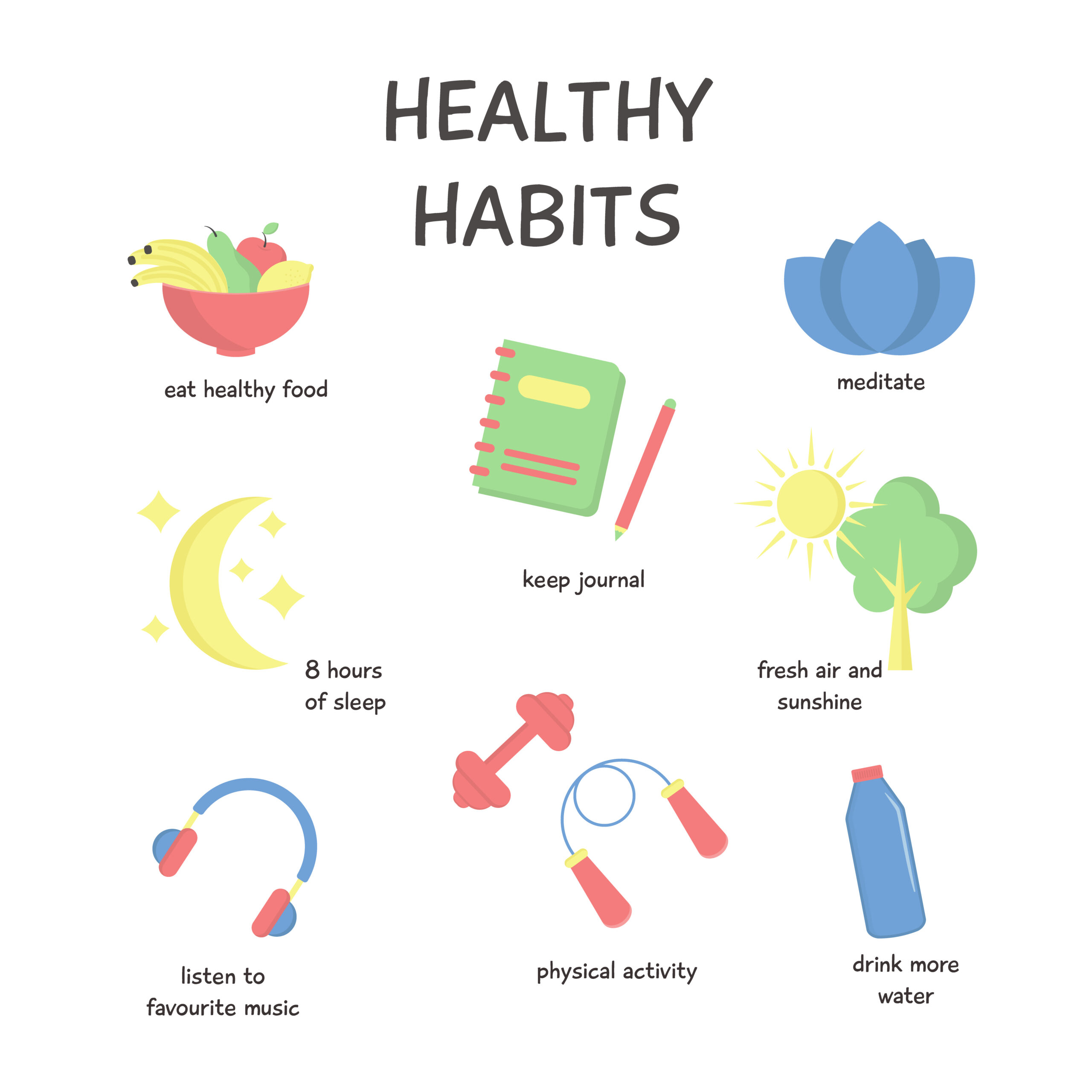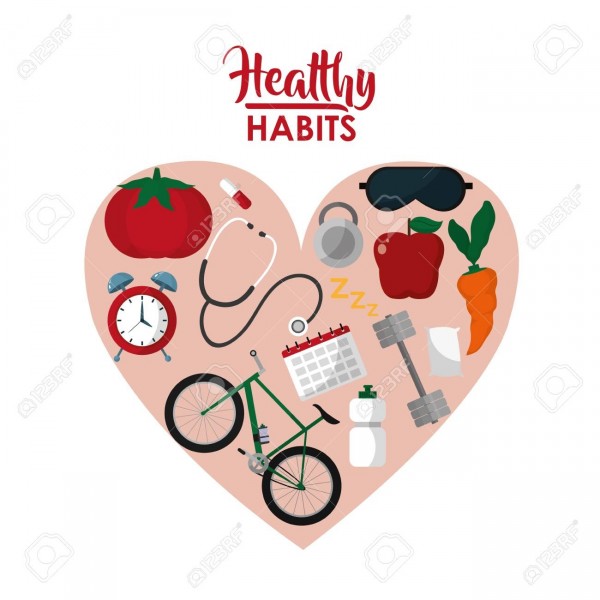Introduction
Your 20s and 30s are a defining period in your life. The habits you cultivate now have the power to shape your future health, happiness, and success. Whether it’s focusing on your physical health, nurturing your mental well-being, or building a solid financial foundation, starting early makes all the difference. Let’s dive into the habits that will help you lead a balanced and fulfilling life.
Table of Contents
Physical Health Habits
Prioritizing Regular Exercise
Exercise is not just about looking fit; it’s about staying strong, active, and energetic. Regular physical activity reduces the risk of chronic diseases like diabetes, heart disease, and obesity.
You don’t need to spend hours at the gym. A mix of cardio, strength training, and flexibility exercises is enough. For instance:
- Cardio: Walking, running, or cycling for 30 minutes, 5 days a week.
- Strength Training: Weightlifting or resistance bands twice a week.
- Flexibility: Yoga or stretching exercises to improve mobility.
Find an activity you enjoy, like dancing, swimming, or hiking, to stay consistent.
Eating a Balanced Diet
Your 20s and 30s are the perfect time to develop a healthy relationship with food. Focus on a diet rich in fruits, vegetables, lean proteins, whole grains, and healthy fats. Avoid processed foods, excessive sugar, and trans fats.
Practical tips for healthier eating include:
- Meal Prep: Cook meals in advance to avoid unhealthy takeout.
- Healthy Snacking: Replace chips with nuts, fruits, or yogurt.
- Portion Control: Use smaller plates to avoid overeating.
Staying Hydrated
Water is essential for every function in your body, from digestion to skin health. Aim to drink at least 8 glasses a day. If plain water bores you, try:
- Adding lemon, cucumber, or mint for flavor.
- Using a water tracker app to monitor your intake.
- Keeping a reusable water bottle with you at all times.
Mental and Emotional Wellness

Practicing Mindfulness and Meditation
Stress and anxiety can take a toll on your mental health. Practicing mindfulness or meditation helps calm the mind, improve focus, and reduce stress.
Start with just 5-10 minutes a day. Apps like Calm or Headspace provide guided sessions. You can also try breathing exercises like the 4-7-8 technique: inhale for 4 seconds, hold for 7, and exhale for 8.
Building Emotional Resilience
Life will throw challenges your way, but resilience helps you bounce back stronger. Journaling, practicing gratitude, and focusing on positive affirmations can make a big difference. For instance, writing down three things you’re grateful for each day cultivates a positive mindset.
Limiting Screen Time and Social Media Use
Excessive screen time can lead to mental fatigue and affect your sleep. Set boundaries like:
- No screens an hour before bed.
- Using apps to monitor screen time.
- Scheduling “offline” weekends or digital detox days.
Financial Habits for Long-Term Security

Budgeting and Saving
Creating a budget and sticking to it is one of the most critical habits to develop in your 20s and 30s. A budget helps you manage your income, control expenses, and save for the future. Begin by tracking your spending to identify areas where you can cut back.
Here are steps to get started:
- 50/30/20 Rule: Allocate 50% of your income to needs, 30% to wants, and 20% to savings.
- Emergency Fund: Aim to save 3–6 months’ worth of expenses for unexpected situations.
- Apps: Use tools like Mint or YNAB (You Need a Budget) to simplify the process.
Small steps, like saving $5 a day, can grow into significant savings over time.
Investing Early
The earlier you start investing, the more time your money has to grow through compound interest. Even small contributions add up over decades. Focus on low-risk, beginner-friendly options like:
- Index Funds: Diversified and low-cost.
- Retirement Accounts: Contribute to a 401(k) or an IRA.
- Robo-Advisors: Automate your investments with platforms like Betterment or Wealthfront.
Don’t let fear of complexity hold you back—start small and learn as you go.
Relationship and Social Health

Nurturing Meaningful Relationships
Your relationships can greatly influence your happiness and emotional well-being. Prioritize quality over quantity by fostering connections that uplift and support you.
Tips to build stronger bonds include:
- Regular Communication: Make time for family and friends. Even a quick check-in means a lot.
- Acts of Kindness: Small gestures like sending a thoughtful text or offering help.
- Active Listening: Be present in conversations and show genuine interest.
Remember, relationships are a two-way street—give as much as you receive.
Effective Communication Skills
Good communication can strengthen relationships, resolve conflicts, and enhance your professional life. Key techniques include:
- Active Listening: Focus on understanding, not just replying.
- Non-Verbal Cues: Pay attention to body language and tone.
- Empathy: Try to see things from the other person’s perspective.
Practice makes perfect, so don’t shy away from honest conversations.
Career and Personal Development
Setting Clear Goals
Goals give your life direction and purpose. Without them, it’s like sailing without a destination. Use the SMART framework:
- Specific: Define exactly what you want.
- Measurable: Track your progress.
- Achievable: Be realistic.
- Relevant: Align goals with your priorities.
- Time-Bound: Set deadlines.
For example, if you aim to learn a new skill, break it into smaller, manageable milestones.
Continuous Learning
The job market evolves rapidly, and staying relevant requires ongoing skill development. Whether it’s learning a new language, mastering coding, or improving leadership skills, there are endless opportunities for growth.
Resources for lifelong learning:
- Free Courses: Platforms like Coursera, Udemy, and Khan Academy.
- Podcasts and Books: Listen to industry leaders and read regularly.
- Workshops and Networking: Attend events to expand your knowledge and connections.
Healthy Lifestyle Practices

Getting Enough Sleep
Sleep is a cornerstone of health, yet many people sacrifice it for productivity. In your 20s and 30s, prioritizing 7–9 hours of sleep per night helps improve focus, mood, and physical health.
Tips for better sleep:
- Consistency: Go to bed and wake up at the same time daily.
- Sleep Environment: Keep your bedroom cool, dark, and quiet.
- Avoid Stimulants: Limit caffeine and screen time before bed.
Sleep isn’t a luxury—it’s essential for peak performance.
Regular Health Checkups
Preventive healthcare can save you from serious illnesses later. Schedule regular checkups to monitor your blood pressure, cholesterol, and other vital metrics.
Key screenings include:
- 20s: Eye exams, dental checkups, and STD tests.
- 30s: Blood pressure, cholesterol, and diabetes screenings.
- Vaccinations: Stay up to date on recommended vaccines.
Being proactive now helps prevent issues from escalating.
Avoiding Harmful Substances
It’s easy to fall into habits like smoking, excessive drinking, or recreational drug use, but the long-term effects can be devastating. Look for healthier ways to unwind, such as:
- Exercise or yoga.
- Journaling or creative hobbies.
- Joining a support group if you’re struggling.
Small, consistent efforts can help you lead a healthier, happier life.
Conclusion
Developing healthy habits in your 20s and 30s sets the stage for a vibrant and fulfilling life. From maintaining your physical health to nurturing meaningful relationships and securing your financial future, these habits create a solid foundation. Start small, stay consistent, and remember—your future self will thank you for the effort you put in today.
Frequently Asked Questions
What are some easy healthy habits to start with?
Start with drinking more water, getting 7–9 hours of sleep, and exercising for 30 minutes a day.
How can I stay motivated to maintain these habits?
Set clear goals, track your progress, and reward yourself for milestones.
How long does it take to form a habit?
It varies, but research suggests it takes 21–66 days to establish a new habit.
Can I start these habits in my late 30s or 40s?
Absolutely! It’s never too late to make positive changes and enjoy the benefits.
How do I balance multiple habits effectively?
Prioritize, focus on one habit at a time, and gradually integrate others into your routine.









